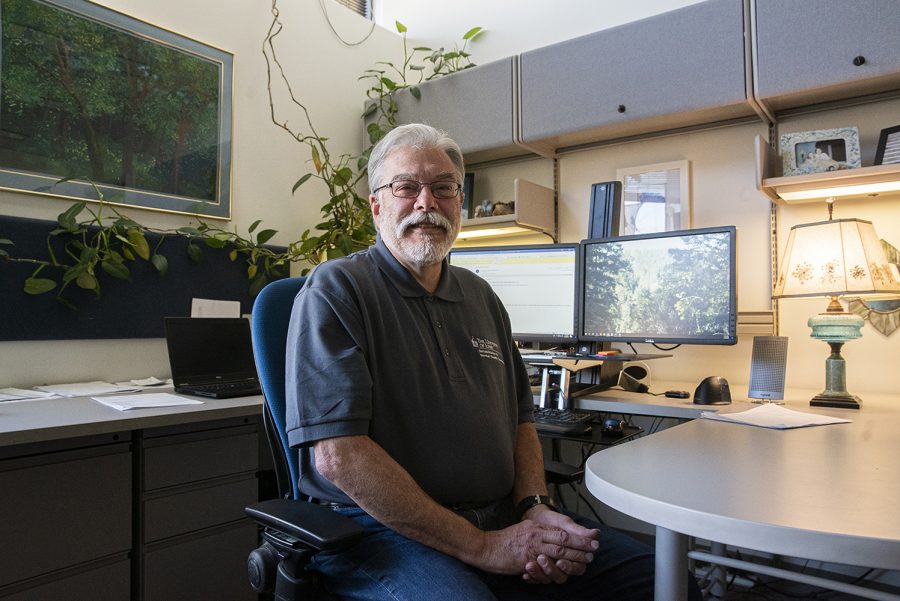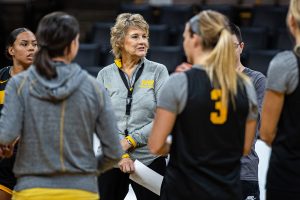UI receives grant to train ASL users as vocational rehabilitation counselors
The University of Iowa recently received a $1 million grant from the U.S. Department of Education to train students who know American Sign Language to be vocational rehabilitation counselors.
University of Iowa Education Researcher John S. Wadsworth poses for a portrait in the Lindquist Center on Tuesday, November 5th, 2019. The UI College of Education has received a $1 million grant to increase the number of eligible applicants for vocational rehabilitation who are trained in American Sign Language.
November 6, 2019
Iowa and several neighboring Midwestern states are experiencing a shortage in vocational rehabilitation counselors who have the training to serve people who may not be able to communicate vocally due to a disability or impairment.
The University of Iowa recently received a $1 million grant to train students who know American Sign Language to be vocational rehabilitation counselors in Iowa.
The grant will pay for the tuition and living stipend of students for the four semesters they are at the UI and taking courses to become a qualified vocational rehabilitation counselor, said John Wadsworth, UI professor of rehabilitation counseling.
A vocational rehabilitation counselor is someone who specializes in helping people find a better quality of life through work, he said. The counselors focus on people who have employment or participation barriers, he added, which can sometimes be people with disabilities.
The grant aims for students to begin their careers at the state or federal-level vocational services departments, Wadsworth said. Recruiting students who know ASL will allow counselors to better serve the deaf community as well as others who use the language to communicate, he said.
In 2014, the unemployment rate for deaf people was 4.6 percent — only 0.3 percent lower than the rate for hearing people, according to a 2016 report from the National Deaf Center on Post Secondary Outcomes. However, 47 percent of deaf people were not in the labor force at all.
“ASL is one of the largest alternatives to vocalization,” Wadsworth said. “So, our goal is to increase the capacity of counselors who know ASL, so that they can meet the needs of a wider community.”
The grant will be used jointly by the rehabilitation counseling department in the UI College of Education, the American Sign Language program in the Department of World Languages, and the Iowa Department of Vocational Rehabilitation, he said.
RELATED: New UI hearing aid technology allows users to connect to wireless devices
The Iowa Department of Vocational Rehabilitation has partnered with the UI to receive qualified applicants for their agency, said April Stotz, department training manager.
The department also has a mentorship program where students can intern or shadow employees in the career they are interested in, she said.
“We want to make sure we’re still reaching [ASL users] and able to provide this support,” Stotz said. “So, we’re wanting to get individuals on board that speak ASL so that we can reach out and continue to serve that population.”
The ASL program will provide recruitment but also consultation and expertise in the area, Wadsworth said, teaching counselors how to best meet people’s needs.
Students in the vocational rehabilitation program will be able to attend events hosted by the ASL program to keep them continually informed and learning the language, said ASL department head Robert Vizzini said in an email to The Daily Iowan.
Along with a comprehension of ASL, an insight and understanding of Deaf culture and the experiences of deaf people allows counselors to identify and help people overcome barriers to employment, he said.
“This represents a real commitment to improving employment opportunities here in Iowa and across the region,” Vizzini said. “We look forward to having student counselors trained to work with employers to give Deaf people a greater chance at long-term and fulfilling employment.”






